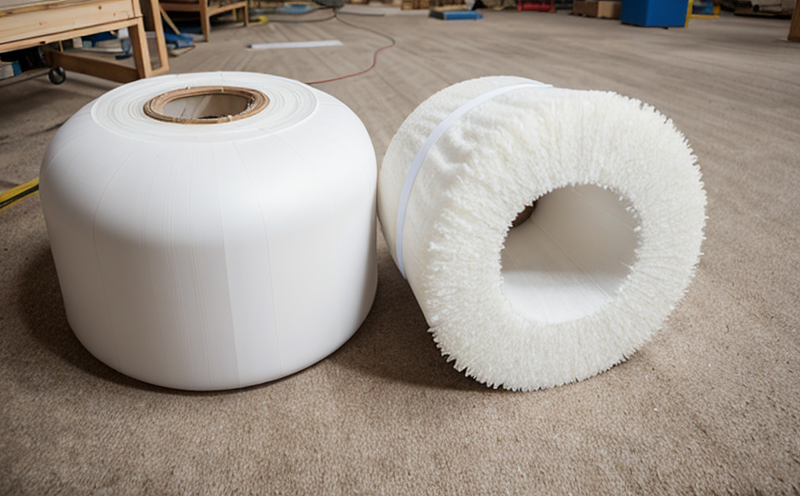ASTM E1007 Field Impact Insulation Class Testing
The ASTM E1007 field impact insulation class (IIC) test is a critical standard in acoustics, vibration, and noise testing for assessing the sound insulation performance of building materials. This test evaluates how effectively a material can resist the transmission of airborne sound between rooms due to impacts such as footsteps or furniture movements.
The IIC value is determined by measuring the sound level difference transmitted through the test specimen under specified impact conditions. The primary goal of ASTM E1007 testing is to ensure that building materials provide sufficient sound insulation, which is essential for creating quiet and comfortable living spaces in residential buildings as well as offices and commercial environments.
The standard outlines detailed procedures for conducting field tests on site rather than in a laboratory setting. This approach ensures that the material's performance can be evaluated under real-world conditions where it will ultimately be used. The test involves placing the specimen between two rooms, subjecting one room to impact sounds, and then measuring the sound transmission loss.
Impact insulation class testing is particularly important for architects, engineers, and construction professionals who are tasked with selecting materials that meet specific noise control requirements. By understanding the IIC values of different materials, designers can make informed decisions about which products will best suit their projects' acoustical needs.
- Soundproofing Requirements: ASTM E1007 helps ensure compliance with local and international building codes that mandate specific sound insulation levels. This is crucial for meeting the expectations of clients and regulatory bodies alike.
- Design Flexibility: With accurate IIC values, architects can explore various design options while ensuring they meet required noise control standards without compromising other aspects of the project.
- Ethical Considerations: Using ASTM E1007 testing promotes responsible and ethical building practices by contributing to healthier living environments for occupants.
The test can be used across various sectors including residential buildings, commercial offices, schools, hospitals, and other public spaces where noise control is paramount. For instance, in educational facilities, the ability to minimize sound transmission between classrooms can significantly enhance learning outcomes. In healthcare settings, reducing noise levels can contribute to better patient recovery and staff comfort.
Given its importance, it's essential that ASTM E1007 testing be conducted by experienced laboratories equipped with the necessary expertise and resources. Eurolab, for example, employs highly trained professionals who adhere strictly to the standard's requirements. This ensures accurate and reliable IIC values that can be trusted.
The impact of ASTM E1007 testing extends beyond just the materials themselves; it impacts all stakeholders involved in construction projects. Quality managers rely on these tests to ensure compliance with standards, while R&D engineers use the results to improve product design. Compliance officers gain peace of mind knowing that their buildings meet necessary regulations. Ultimately, customers benefit from quieter environments and reduced stress caused by noise pollution.
Eurolab Advantages
At Eurolab, we pride ourselves on providing comprehensive and accurate ASTM E1007 field impact insulation class testing services. Our team of experts ensures that every test adheres strictly to the standard's requirements, delivering reliable IIC values for your materials.
- Expertise: Our professionals have extensive experience in acoustics and vibration testing, allowing us to provide precise and consistent results.
- Equipment: We use state-of-the-art instrumentation tailored specifically for ASTM E1007 testing, ensuring high-quality data collection.
- Compliance: By adhering strictly to ASTM standards, we guarantee that your test results are valid and acceptable for regulatory compliance purposes.
- Rapidity: We offer efficient turnaround times so you can receive your IIC values promptly without delays.
Choosing Eurolab for your ASTM E1007 testing needs means partnering with a reliable partner committed to excellence. Our commitment to quality and accuracy sets us apart in the industry, ensuring that we deliver services that meet or exceed expectations every time.
Customer Impact and Satisfaction
Our clients benefit greatly from our ASTM E1007 testing services. By partnering with Eurolab, they gain access to experts who understand the nuances of acoustics and vibration testing, leading to more informed decision-making in material selection.
Customers report increased confidence knowing that their buildings comply fully with all relevant noise control standards. This contributes to creating healthier living and working environments for everyone involved. Additionally, our rapid turnarounds allow projects to progress smoothly without unnecessary delays, further enhancing customer satisfaction.
We are proud of the positive feedback received from satisfied clients who appreciate our professionalism and dedication to providing top-notch testing services. Together with Eurolab, you can ensure that your construction projects meet not only regulatory requirements but also exceed expectations in terms of sound insulation performance.





